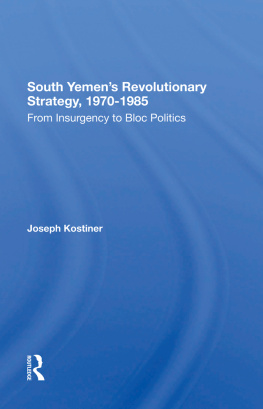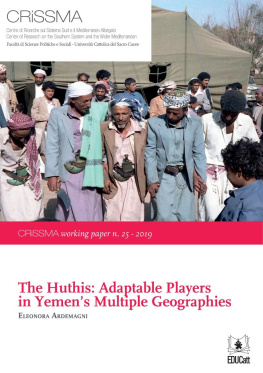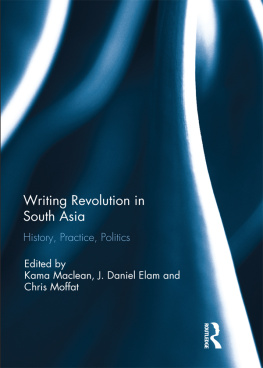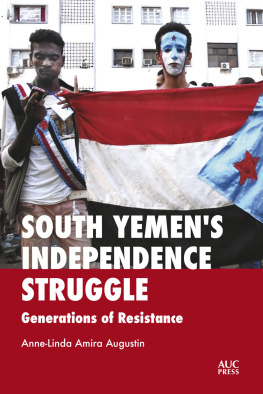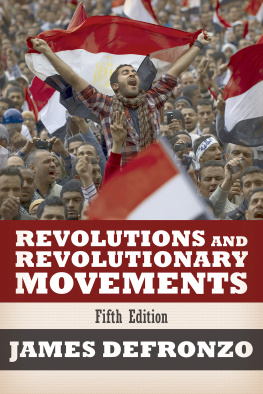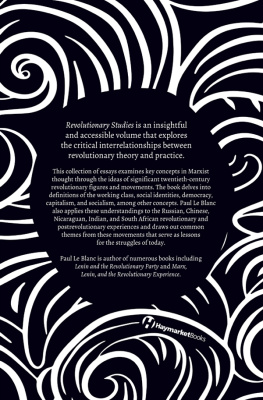First published 1990 by Westview Press
Published 2019 by Routledge
52 Vanderbilt Avenue, New York, NY 10017
2 Park Square, Milton Park, Abingdon, Oxon OX14 4RN
Routledge is an imprint of the Taylor & Francis Group, an informa business
Copyright 1990 by Tel Aviv University, Jaffee Center for Strategic Studies
All rights reserved. No part of this book may be reprinted or reproduced or utilised in any form or by any electronic, mechanical, or other means, now known or hereafter invented, including photocopying and recording, or in any information storage or retrieval system, without permission in writing from the publishers.
Notice:
Product or corporate names may be trademarks or registered trademarks, and are used only for identification and explanation without intent to infringe.
Library of Congress Cataloging-in-Publication Data
Kostiner, Joseph.
South Yemen's revolutionary strategy, 1970-1985: from
insurgency to bloc politics / by Joseph Kostiner.
p. cm. (Publications of the Jaffee Center for
Strategic Studies, Tel Aviv University)
ISBN 0-8133-0958-1
1. Yemen (People's Democratic Republic)Politics and
government. 2. Yemen (People's Democratic Republic)Foreign
relationsSoviet Union. 3. Soviet UnionForeign relations
Yemen (People's Democratic Republic) I. Title. II.
Series.
DS274.A28K66 1990
327.4705332dc20 89-33023
CIP
ISBN 13: 978-0-367-28801-3 (hbk)
The Jaffee Center for Strategic Studies (JCSS)
The Center for Strategic Studies was established at Tel-Aviv University at the end of 1977. In 1983 it was named the Jaffee Center for Strategic Studies in honor of Mr. and Mrs. Mel Jaffee. The objective of the Center is to contribute to the expansion of knowledge on strategic subjects and to promote public understanding of and pluralistic thought on matters of national and international security.
The Center relates to the concept of strategy in its broadest meaning, namely, the complex of processes involved in the identification, mobilization and application of resources in peace and war, in order to solidify and strengthen national and international security.
International Board of Trustees
Chairman: Melvin Jaffee
Immediate Past Chairman: Joseph H. Strelitz (deceased)
Robert H. Arnow, Arnold Y. Aronoff, Newton D. Becker, Jack Berlin, Henry Borenstein, Edgar M. Bronfman, Simon Chilewich, Bertram J. Cohn, Stewart M. Colton, Lester Crown, Joseph K. Eichenbaum, Danielle and Shimon Erem, Allan Fainbarg, Dr. Gerald Falwell, Jacob Feldman, Arnold D. Feuerstein, David Furman, Guilford Glazer, Eugene M. Grant, Vernon Green, Martin J. Gross, Michael M.H. Gross, Irving B. Harris, Betty and Sol Jaffee, Philip M. Klutznick, Judy and Joel Knapp, Fred Kotek, Raymond Kulek, Max L. Kunianski, Mark Lambert, Rose Lederer, Fred W. Lessing, Morris L. Levinson, Edward Levy, Peter A. Magowan, Hermann Merkin, Stephen Meadow, Monte MonAster, Max Perlman, Milton J. Petrie, Gary P. Ratner, Raphael Recanati, Meshulam Riklis, Morris Rodman, Elihu Rose, Malcolm M. Rosenberg, Irving Schneider, George Shrut, Marvin Simon, Ruth Sinaiko, Walter P. Stern, Dr. Robert J. Stoller, Leonard R. Strelitz, James Warren, David Warsaw, Jack D. Weiler, Marvin A. Weiss, Emanuel A. Winston, Bert Wolstein, Paul Yanowicz
The research for and composition of this study were carried out under the auspices of the Jaffee Center for Strategic Studies at Tel Aviv University. I am grateful to the Head of Center, Major General (res.) Aharon Yariv, to the current and previous deputy directors, Joseph Alpher and Mark Heller respectively, and to the former head of JCSS's Project on Low Intensity Warfare, Ariel Merari, for their encouragement and assistance. Abraham Ben-Zvi and other JCSS analysts offered critical remarks. The encouragement and good advice of Itamar Rabinovich, former director of my home institute, the Moshe Dayan Center for Middle Eastern and African Studies, guided me throughout. The immense wealth of material available at the Dayan Center's information reservoir, and the help of its staff, were instrumental in furthering the research. The dedication, analytical skills and good spirit of Eitan Lederer, who assisted me in my research, rendered the period of our cooperation a real joy. Uzi Rabbi and Tzachi Fux also deserve thanks for their assistance. My colleagues Stephen Page of Queen's University and Gregory Gause of Columbia University read the manuscript and offered both general, illuminating observations and useful specific points. As ever, all the members of my family, great and small, provided me with a conducive environment and incentives to see the study through.
The Dayan and Jaffee Centers are, to paraphrase Winston Churchill's assertion concerning the British and American peoples, two centers separated by one common corridor. As a member of the Dayan Center, I have enjoyed walking that corridor to the JCSS end and having its researchers cross it toward ours, as part of our cooperation in a variety of projects. I hope this study provides a model for further collaboration between our two centers.
South Yemen's regional strategy evolved from insurgency to bloc politics over a period of nearly 20 years following independence in 1967. This reflected a maturation process in the country's foreign and strategic policymaking. It marked Aden's ability to emerge from a pre-independence strategy based on tribal practices and linked with the relative isolation of the Arabian Peninsula from superpower influence, to one that suited both the Peninsula's growing involvement in world affairs in the late 1970s, and the PDRY's own internal political and economic development.
This change evolved through a process of intra-elite struggle. Notwithstanding their overall adherence to Marxism, members of the South Yemeni elite were also influenced by views emanating from their region of origin, and by the experience of governing a country and running a party. All these caused them to develop varied perceptions of state-building and foreign policy.
The South Yemeni elite originally had to cope with an intrusive environment that was characterized by inter-tribal, cross-border feuds. By the mid-1970s, however, against a backdrop of the growing strategic importance of oil in and around the Gulf and the Red Sea and the parallel growth in superpower interest in the region, local governments consolidated their rule. In parallel, regional conflicts broadened in scope and became more convoluted. The South Yemeni leaders, faced with the need to stabilize their rule over a young, traditionally decentralized and economically poor state, applied a variety of Marxist strategies to their internal and regional problems.
The changing nature of these internal and external influences led, in turn, to changes in the PDRY's revolutionary strategy. Three main periods can be described. First, between 1970 and 1974 the impact of internal consolidation under a leftist leadership, combined with the initial regional political power vacuum in the Peninsula and the PRC's influence in Aden, caused the country to embark on an insurgency campaign against the Gulf regimes.

